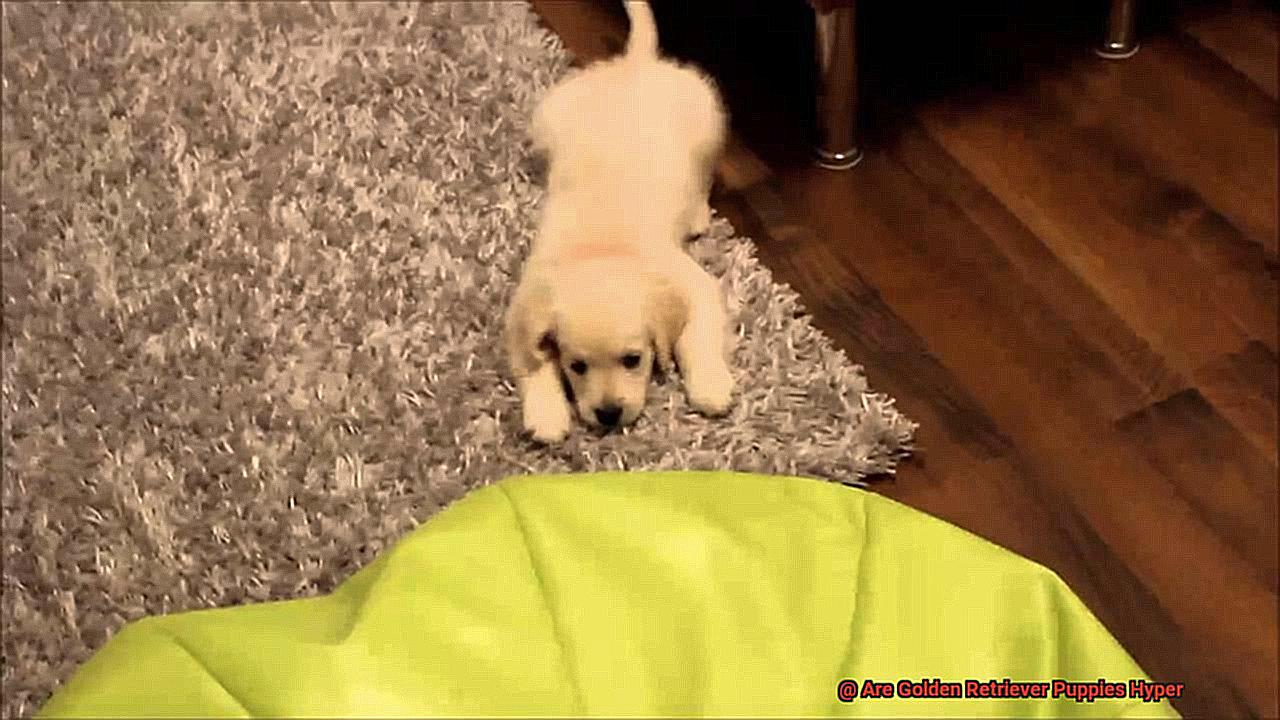Golden retriever puppies are the epitome of cuteness, with their fluffy fur and wagging tails. They are known for their loving personalities and friendly nature, making them one of the most beloved dog breeds worldwide. But, as a potential owner, you may be wondering if they live up to their reputation of being hyperactive. Fear not. In this blog post, we will explore the question ‘Are golden retriever puppies hyper’ and separate fact from fiction.
As a dog enthusiast, you may have heard people talk about how challenging it is to control golden retriever puppies due to their high energy levels. Some even claim that they are impossible to train and will chew your furniture to pieces. Others argue that they are relatively mellow and easygoing even as puppies.
In this article, we will examine the unique traits that make golden retrievers stand out among other breeds and investigate how these traits affect their behavior as puppies. We will cover potential causes of puppy hyperactivity such as breed tendencies and environmental factors while providing tips on how to train and care for your furry friend.
Whether you’re a potential owner looking for some guidance or a current owner seeking advice on how to handle your pup’s energy levels, this article is for you. Join us as we delve into the fascinating world of golden retriever puppy behavior and learn how to ensure they grow into calm, well-behaved adults.
Differentiating Normal Puppy Behavior from Hyperactivity
Contents
- 1 Differentiating Normal Puppy Behavior from Hyperactivity
- 2 Understanding the Breeding History of Golden Retrievers
- 3 How to Raise and Train a Golden Retriever Puppy
- 4 Providing Adequate Exercise and Socialization
- 5 Signs of Hyperactivity in Golden Retriever Puppies
- 6 Tips for Channeling Energy into Positive Outlets
- 7 Conclusion
Understanding the difference is crucial to ensure that your furry friend receives appropriate training and care.
Normal puppy behavior is characterized by playfulness, curiosity, and occasional bursts of energy. Puppies enjoy exploring their surroundings, chewing on toys, and interacting with their owners. Short playful nips at your hands are also common. These behaviors are entirely normal and should not cause concern.
Hyperactivity, on the other hand, is excessive and uncontrollable energy levels that can manifest in constant movement, inability to sit still or focus for more than a few seconds, and destructive behavior such as chewing furniture or digging in the yard. This type of behavior requires immediate attention as it can lead to severe health problems if left untreated.
It is essential to note that how you raise and train your Golden Retriever puppy can significantly influence their behavior. Adequate exercise, socialization, and training can help channel their energy into positive outlets and prevent hyperactivity from becoming an issue. Redirecting their attention to toys or other activities during playtime can also help.
Differentiating normal puppy behavior from hyperactivity plays a crucial role in how you train and care for your pet. If your puppy displays hyperactivity, consider working on calming exercises and providing structured activities to burn off excess energy. By providing proper care and attention to your furry friend, you can ensure that they grow up to be happy and healthy members of your family.
Understanding the Breeding History of Golden Retrievers
Prepare to be amazed by the fascinating history of Golden Retrievers and how it impacts their temperament and behavior. As an expert in this field, I’m thrilled to share my knowledge with you in this informative blog post.
Golden Retrievers were born in Scotland during the 19th century as hunting dogs. They were bred specifically to retrieve game birds, making them highly trainable with a natural instinct to retrieve. However, what sets Golden Retrievers apart from other breeds is their gentle and obedient nature. This makes them the perfect companion for families.
As with any puppy, Golden Retrievers can be hyperactive due to their high energy levels and playful nature. But don’t worry – this behavior is normal for most puppies and typically decreases as they mature. It’s important to consider the lineage of a Golden Retriever when looking for a puppy, though. Reputable breeders carefully select breeding pairs to produce puppies with desirable traits such as intelligence, trainability, and a calm temperament.
The breeding history of Golden Retrievers is a crucial factor in understanding their temperament and behavior. As hunting dogs, they were bred to be gentle and obedient, making them the perfect family dog. Therefore, most Golden Retrievers are friendly, loyal, and eager to please.
How to Raise and Train a Golden Retriever Puppy
Golden retriever puppies are undoubtedly one of the cutest and most lovable creatures on earth. However, as a new pet owner, you may find yourself overwhelmed with the task of raising and training them. But don’t worry, with the right approach, you can help your puppy grow into a well-behaved and balanced adult dog.
Here are some things to consider when raising and training your golden retriever puppy:
Establish a Consistent Routine
Golden retriever puppies thrive on routine. Setting a consistent schedule for feeding, playtime, exercise, and training sessions will help your puppy learn what is expected of them and reduce the likelihood of hyperactivity. A routine will also make it easier for you to plan your day around your puppy’s needs.
Use Positive Reinforcement Techniques
Golden retrievers respond best to positive reinforcement techniques during training. Rewarding good behavior with treats, praise, or playtime instead of punishing bad behavior will encourage your puppy to repeat good actions. Consistency is also critical in training as it helps your puppy understand what is expected of them.
Socialization is Key
Socialization is vital for golden retriever puppies. It involves exposing them to different people, animals, and environments from a young age so that they learn how to behave appropriately in various situations. Proper socialization can prevent behavioral issues such as fearfulness or aggression.
Establish Yourself as the Pack Leader
Golden retrievers are pack animals and need a strong leader to guide them. As their owner, it falls on you to establish yourself as the pack leader by setting clear boundaries and rules for your puppy, and enforcing them consistently. This will help your puppy understand their position in the pack and prevent any dominance issues later on.

Exercise and Mental Stimulation
Golden retrievers are active dogs that require regular physical activity to stay healthy and happy. Providing your puppy with plenty of exercise, such as walks or runs, will help them burn off excess energy. Additionally, golden retrievers also love to play games and solve puzzles, so providing them with toys and activities that challenge their minds can prevent boredom and destructive behavior.
Providing Adequate Exercise and Socialization
You know how adorable and playful they can be. But did you know that providing them with adequate exercise and socialization is crucial for their overall well-being? In this post, we will explore why exercise and socialization are vital for your golden retriever puppy and how to incorporate these activities into your daily routine.
Golden retriever puppies are known for their high energy levels and playful nature. They require a minimum of 30-60 minutes of exercise daily to maintain their physical and mental health. This can include walks, runs, or playing fetch in the yard. Exercise not only keeps your puppy healthy, but it also prevents them from becoming hyperactive and bored.
In addition to physical exercise, socialization is equally crucial for golden retriever puppies. Socialization involves exposing your puppy to various people, animals, and environments, helping them develop good behavior and communication skills while preventing them from becoming anxious or aggressive in unfamiliar situations.
Wondering how to provide socialization for your golden retriever puppy? Puppy classes or training programs can help teach your puppy basic obedience commands while providing opportunities for socialization with other puppies and their owners. Alternatively, taking your puppy on outings to the park or other public places where they can interact with new people and animals is a great option.
It’s essential to remember that exercise and socialization are not only beneficial for your puppy’s physical health but also their mental well-being. A lack of exercise and socialization can lead to boredom, anxiety, and destructive behavior.
Signs of Hyperactivity in Golden Retriever Puppies
Golden retriever puppies are known for their playful and energetic nature, but sometimes that energy can turn into hyperactivity. Hyperactivity in golden retriever puppies can lead to destructive behavior, difficulty in training, and other problems. Therefore, it is crucial for owners to recognize the signs of hyperactivity in their furry friends.
One of the most common signs of hyperactivity in golden retriever puppies is excessive barking and jumping. If your puppy barks excessively and jumps around constantly, even after playtime is over, they may be hyperactive. This behavior can be challenging for owners to control and may make it difficult to calm them down.
Another sign of hyperactivity in golden retriever puppies is destructive behavior. If your puppy chews on furniture, shoes, or other household items, digs holes in the yard, or scratches at doors and windows, this may be a result of boredom or excess energy. This behavior can cause damage to your home and possessions.
Hyperactive golden retriever puppies may also have difficulty focusing and paying attention. They may become easily distracted and have trouble following commands during training sessions. This can make it challenging for owners to teach their puppies basic obedience skills.
Additionally, hyperactive golden retriever puppies may display restlessness and an inability to settle down. They may pace back and forth, have difficulty sleeping, or constantly seek attention from their owners. This behavior can be exhausting for owners who want their pups to relax and enjoy some downtime.
If you notice any of these signs in your golden retriever puppy, it is essential to address them promptly to prevent more serious issues from developing in the future. One way to help manage hyperactivity in your puppy is by providing them with plenty of exercise and socialization. Taking them on daily walks or runs and exposing them to new people, animals, and environments through puppy classes or outings can help maintain their physical and mental health while developing good behavior and communication skills.
Tips for Channeling Energy into Positive Outlets
Golden retrievers are a highly active breed that needs daily exercise, mental stimulation, and socialization. In this article, we’ll explore how owners can manage their puppy’s energy through different techniques.
Exercise
Your golden retriever puppy needs plenty of exercise to burn off their abundant energy. Going for daily walks or runs in the park, playing fetch, and swimming are great ways to tire them out. Regular exercise not only helps reduce hyperactivity but also promotes physical and mental health.
Training
Training is an excellent way to channel your golden retriever puppy’s energy into positive behavior. Teaching basic commands such as sit, stay, and come can help improve impulse control and obedience. Additionally, participating in obedience classes or agility training can provide a structured outlet for your puppy’s energy while also strengthening your bond.
Toys
Toys are an essential tool for managing your puppy’s hyperactivity. Interactive toys such as puzzle feeders or treat-dispensing toys can keep your puppy occupied while also providing mental stimulation. Soft toys for chewing or tossing around are also great options.
Socialization
Socialization is crucial for golden retriever puppies as it helps them develop into well-adjusted adults. Exposing your puppy to new people, animals, and environments can help reduce hyperactivity and anxiety. Socialization should begin early and be ongoing throughout your puppy’s life.
Setting Boundaries
Finally, it’s essential to set boundaries and provide structure for your golden retriever puppy. Crate training, establishing a routine, and teaching basic obedience commands can help prevent destructive behavior. By providing clear guidance and structure, you can help your puppy channel their energy into positive outlets while also preventing destructive behaviors.
Also Read: Why is my Golden Retrievers hair black? – Unleash the Best in Your…
Conclusion
In conclusion, while golden retriever puppies may not be hyperactive per se, they do possess boundless energy and an innate desire to play. As a responsible owner, it’s crucial to distinguish between normal puppy behavior and hyperactivity and take the necessary steps to raise them appropriately.
To fully comprehend their temperament and behavior, one must delve into the breeding history of Golden Retrievers. Bred as hunting dogs, these lovable pups were designed to be gentle and obedient, making them the ideal family companion. Their friendliness, loyalty, and eagerness to please are just some of the many traits that make them so beloved.
Managing a golden retriever puppy’s energy levels can be challenging but rewarding. Regular exercise, positive reinforcement techniques, socialization opportunities, and setting boundaries are all essential factors in keeping their exuberance in check and preventing destructive behavior.
As owners, we must recognize the signs of hyperactivity early on to address them promptly before they escalate into more serious issues. Providing adequate mental stimulation through toys for playtime can also help channel their energy into positive outlets.
In summary, with proper care and attention paid to your golden retriever puppy’s needs, you can ensure that they grow up to be happy and healthy members of your family.









